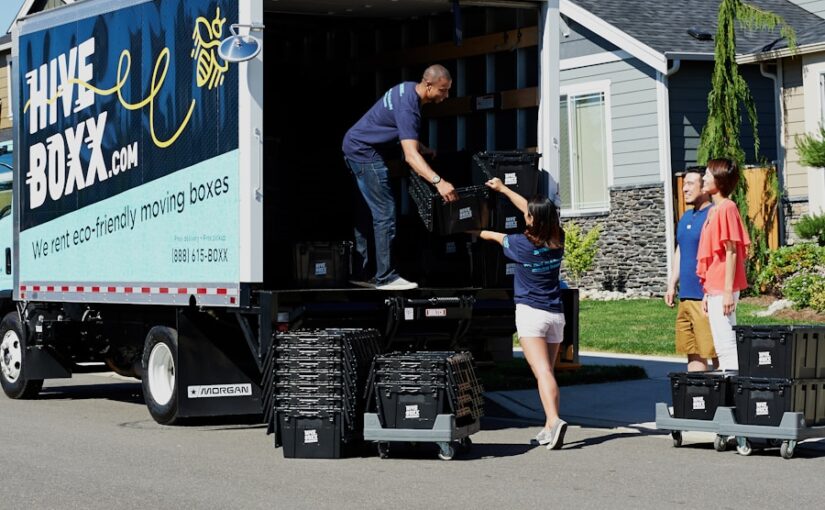In recent years, you may have noticed a significant uptick in the demand for moving services. This surge can be attributed to various factors, including urbanization, population mobility, and the increasing trend of remote work. As more individuals and families relocate for job opportunities or lifestyle changes, the need for reliable moving services has never been greater.
You might find that cities are expanding rapidly, with new residents flocking to urban centers, creating a bustling environment where moving companies thrive. This growing demand presents a unique opportunity for those looking to enter the moving industry, whether as a worker or an entrepreneur. Moreover, the rise of e-commerce has also played a pivotal role in this demand.
With more people shopping online than ever before, the logistics of moving goods have become increasingly complex. You may have observed that businesses are now relying on moving services not just for residential relocations but also for transporting inventory and fulfilling customer orders. This shift has opened up new avenues for moving companies to diversify their services, catering to both residential and commercial clients.
As you consider a career in this field, it’s essential to recognize that the demand for moving services is likely to continue growing, making it a stable choice for employment.
Advancements in Technology and the Moving Industry
As you delve deeper into the moving industry, you will discover that technology has revolutionized how moving companies operate. From sophisticated inventory management systems to GPS tracking for vehicles, advancements in technology have streamlined processes and improved efficiency. You might find it fascinating how these tools not only enhance the customer experience but also make the job easier for workers.
For instance, mobile apps allow movers to communicate in real-time with clients, providing updates on their shipment status and estimated arrival times. Additionally, technology has enabled companies to optimize their routes, reducing fuel consumption and saving time. You may appreciate how this not only benefits the company’s bottom line but also contributes to environmental sustainability.
The integration of virtual reality and augmented reality in the moving industry is another exciting development. These technologies allow potential clients to visualize their new spaces and plan their moves more effectively. As you explore career opportunities in this field, consider how being tech-savvy can give you an edge in a rapidly evolving industry.
The Flexibility and Variety of Job Opportunities in the Moving Industry
One of the most appealing aspects of the moving industry is the flexibility it offers in terms of job opportunities. Whether you prefer hands-on work or administrative roles, there is something for everyone. You might find yourself drawn to physically demanding positions such as packing and loading trucks or driving large vehicles.
Alternatively, if you have strong organizational skills, you could excel in roles related to logistics and customer service. The variety of positions available means that you can tailor your career path to align with your interests and strengths. Moreover, many moving companies offer flexible schedules that can accommodate your lifestyle.
If you are a student or someone looking for part-time work, you may appreciate the ability to choose shifts that fit your availability. This flexibility can be particularly beneficial if you are balancing other commitments or pursuing further education. As you consider your options within the moving industry, think about how this variety can lead to a fulfilling career that adapts to your personal needs.
The Potential for Career Advancement and Growth in the Moving Industry
As you embark on a career in the moving industry, you will likely find numerous opportunities for advancement and growth. Many companies prioritize promoting from within, allowing dedicated employees to climb the ranks over time. You may start as a mover or driver and eventually transition into supervisory or managerial roles as you gain experience and demonstrate your capabilities.
This upward mobility is not only rewarding but also encourages a culture of loyalty and commitment among employees. Furthermore, the skills you acquire in the moving industry are transferable to other fields as well. For instance, leadership skills developed while managing a team of movers can be invaluable in any managerial position.
You might also find that problem-solving abilities honed during challenging moves can serve you well in various professional contexts. As you navigate your career path, keep in mind that the potential for growth in the moving industry is significant, making it an attractive option for those seeking long-term career satisfaction.
The Importance of Customer Service in the Moving Industry
In the moving industry, exceptional customer service is paramount. You may have experienced firsthand how stressful relocating can be, which is why providing a positive experience for clients is crucial. From the initial consultation to the final delivery of belongings, every interaction matters.
As a professional in this field, you will need to develop strong communication skills and empathy to understand your clients’ needs and concerns fully. Moreover, positive customer experiences often lead to referrals and repeat business, which are essential for a company’s success. You might find that going above and beyond to ensure client satisfaction not only enhances your reputation but also contributes to your personal fulfillment in your work.
As you consider a role in the moving industry, remember that your ability to connect with customers and provide outstanding service can set you apart from others in the field.
The Physical and Mental Benefits of Working in the Moving Industry
Physical Benefits of Working in the Moving Industry
You may find that working in the moving industry helps you stay physically fit, which can lead to a range of health benefits. Regular physical activity can improve cardiovascular health, boost mood, and increase energy levels.
The Importance of Social Interaction and Camaraderie
Being part of a team in the moving industry fosters camaraderie and social interaction, which can enhance your mental well-being. Working with others can help you build strong relationships, reduce feelings of loneliness, and improve your overall mental health.
Managing the Challenges of the Job
While working in the moving industry can be physically demanding, it’s essential to recognize the potential challenges that come with the job. The physical demands can lead to fatigue or strain if not managed properly. Developing strategies for self-care and injury prevention is crucial to ensure longevity in your career. By cultivating a positive mindset and finding ways to manage the physical demands of the job, you can navigate the ups and downs of this dynamic industry.
The Potential for Entrepreneurship and Small Business Ownership in the Moving Industry
If you have an entrepreneurial spirit, the moving industry offers ample opportunities for starting your own business. With relatively low barriers to entry compared to other industries, you might find it appealing to establish a local moving company or specialize in niche services such as packing or storage solutions. As you consider this path, think about how your unique skills and experiences can set your business apart from competitors.
Moreover, entrepreneurship in the moving industry allows you to create a brand that reflects your values and vision. You may choose to focus on eco-friendly practices or exceptional customer service as key differentiators. Building a successful business requires dedication and hard work, but the potential rewards—both financial and personal—can be significant.
As you explore this avenue, remember that networking within the industry can provide valuable insights and support as you embark on your entrepreneurial journey.
The Job Security and Stability of Working in the Moving Industry
Finally, one of the most compelling reasons to consider a career in the moving industry is the job security it offers. As demand continues to rise due to factors like urbanization and e-commerce growth, you can feel confident that there will always be a need for skilled movers and logistics professionals. This stability can provide peace of mind as you plan your future career path.
Additionally, many moving companies offer competitive wages and benefits packages that contribute to long-term job satisfaction. You may find that working for established companies provides not only financial stability but also opportunities for professional development through training programs and workshops. As you weigh your options for employment, consider how the job security inherent in the moving industry can lead to a fulfilling and stable career for years to come.



